|
Shelf Awareness presents Shelf Awareness | Week of Tuesday, January 3, 2017
|
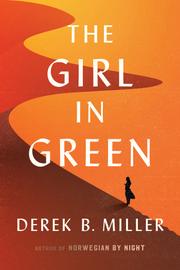 | Publisher: | | Houghton Mifflin Harcourt |
| Genre: | | War & Military, Literary, Fiction
|
| ISBN: | | 9780544706255 |
| Pub Date: | | January 2017 |
| Price: | | $26 |
| The Girl in Green
by Derek B. Miller
In Derek B. Miller's sophomore novel, The Girl in Green, he follows two unlikely heroes on an errand of mercy in one of the most dangerous places on Earth: modern-day Iraq. During the uneasy ceasefire following the first Gulf War in 1991, American soldier Arwood Hobbes meets Thomas Benton, an older British journalist, in the midst of the "industrial and inescapable" boredom at his post 150 miles from the Kuwaiti border. Cocky and determined to get a local perspective on the Shiite rebellion, Benton takes Arwood's semi-dare to sneak over to a nearby town to interview Iraqis. When violence strikes and Arwood steps in to rescue Benton, the two try to save a Kurdish girl in a green dress, but are unable to stop the teen's murder at the hands of a Ba'athist colonel. Arwood and Benton both lose a part of themselves when the girl dies.
Twenty-two years later, Benton hears from an agitated Arwood, who believes he just saw the girl in green, un-aged and in the same dress, in an Internet video of a mortar attack on refugees in Kurdistan. Arwood is convinced that the universe has granted them a chance to right a terrible wrong.
Miller ( Norwegian by Night) pulls off an amazing feat of alchemy here, because this chronicle of trauma, violence and endless conflict is the unlikely feel-good story of the year. Not only does he pepper the narrative with enough absurdist humor and one-liners to keep readers helplessly grinning at the darkest moments, he hits points of emotional resonance with the precision of a sniper. -- Jaclyn Fulwood |
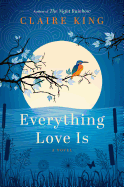 | Publisher: | | Bloomsbury USA |
| Genre: | | Romance, Contemporary, Literary, Fiction
|
| ISBN: | | 9781632865380 |
| Pub Date: | | December 2016 |
| Price: | | $27 |
| Everything Love Is
by Claire King
Claire King launches her beautiful second novel with a riveting scene on a train bound for Toulouse, France, in May of 1968. A mysterious young woman goes into sudden, violent labor. Sharing her train compartment is a midwife who, seeing her distress, offers help. But by the time this brutal, powerful scene is over, the woman--with no identification--will lose her life giving birth to a baby boy, who will be saved by the midwife, a married woman unable to have children, who will become the baby's mother.
What follows is the story of Baptiste Molino, the infant, now a middle-aged bachelor, a man raised in the French countryside. Baptiste has lived a good--yet rather uneventful--life. He thinks he is fulfilled and happy until Amandine Rousseau, an attractive woman wearing green shoes, shows up at his door. During their first meeting, Amandine tells Baptiste she wants "something that makes me feel alive. Joy, passion, despair, something to remember or something to regret.... Perhaps after all this time, what I really want... is to fall in love." As Baptiste learns more about Amandine and her life, he feels challenged, and he begins to question himself: Is there something missing from his life? Is he truly happy? Amandine's presence causes ripples that turn into waves of memories that encourage Baptiste to go on a labyrinthine journey in search of himself.
|
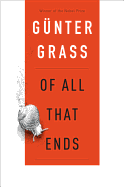 | Publisher: | | Houghton Mifflin Harcourt |
| Genre: | | Literary, Fiction
|
| ISBN: | | 9780544785380 |
| Pub Date: | | December 2016 |
| Price: | | $28 |
| Of All That Ends
by Günter Grass, trans. by Breon Mitchell
If you're in your 80s, have received two pacemakers and have enjoyed "decades of self-indulgence in hand-rolled cigarettes and well-stuffed pipes," your thoughts are bound to turn toward death. In Of All That Ends, a posthumously published collection of poems and lyric prose, Nobel laureate Günter Grass ( The Tin Drum) contemplates his mortality and the fate of a world he's soon to depart. He does so with morbid wit and more than a trace of sorrow. This book, illustrated with many of Grass's drawings, addresses topics that range from his last remaining lower tooth, which he says "would also make a suitable Christmas tree ornament, like a pearl on a pendant," to German chancellor Angela Merkel, Aleppo, the Greek financial crisis and "the bombs exploding daily in Iraq."
But it's not all gloom and doom. In one poem, he writes of a beloved typewriter, "sleek and elegant in form, as if Leonardo da Vinci had invented the typewriter on the side." And he reminds us that there's often plenty of life left in an old body. When 80-something Grass says he's too old to write prose, the 101-year-old scholar he complained to "took me sharply to task," pointing out that there's "so much that's new, still untasted.... It's all right to be amazed again." The message of this moving collection is clear: life ends, but assuming you're in control of the matter, that's no reason to limp across the finish line. -- Michael Magras, freelance book reviewer |
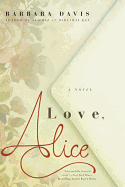 | Publisher: | | Berkley |
| Genre: | | Contemporary Women, Family Life, Fiction
|
| ISBN: | | 9780451474810 |
| Pub Date: | | December 2016 |
| Price: | | $16 |
| Love, Alice
by Barbara Davis
Societal stigmas and taboos reside at the heart of Love, Alice by Barbara Davis (Summer at Hideaway Key). Set in Charleston, S.C., the novel focuses on 36-year-old Dovie Larkin, whose fiancé committed suicide two weeks before their wedding. A year later, Dovie spends her lunch hours sitting graveside at the cemetery, still grappling with what happened and why, unable to pick up the pieces of her life.
One day, Dovie spots an elderly woman leaving a note at the striking angel grave marker of Alice Tandy, a young maid who died 32 years earlier and, to the bewilderment of locals, had been buried in a plot belonging to one of the richest families in town. After the woman leaves, Dovie reads the note: a mother's impassioned regret for having sent her young daughter to an asylum for unwed mothers in Cornwall, England, in the 1960s. Dovie, identifying with the unresolved grief expressed, soon discovers a trove of related letters in the cemetery's lost and found, and sets off in search of the writer, Dora Tandy, who has come to Charleston to learn more about the life--and death--of her long-lost daughter, Alice.
Hope, love and forgiveness permeate this beautifully rendered novel where both Dovie and Dora unearth answers to mysteries and reveal secrets that will come to define their respective lives and quests for peace. -- Kathleen Gerard, blogger at Reading Between the Lines |
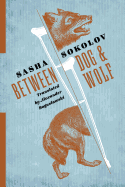 | Publisher: | | Columbia University Press |
| Genre: | | Literary Criticism, Literary Collections, Russian & Former Soviet Union
|
| ISBN: | | 9780231181464 |
| Pub Date: | | December 2016 |
| Price: | | $30 |
| Between Dog and Wolf
by Sasha Sokolov, trans. by Alexander Boguslawski
What do readers do when a work of literature is actively trying to trick them? Some books have twists and turns of plot, often with a stunning reveal, but they typically have resolutions, or at least some final thought for readers to depart with. But what about a work that has very little plot to speak of, or one whose plot points are entirely contradicted later in the text? Sasha Sokolov's Between Dog and Wolf (a French expression for "twilight," which is perfectly suited for this story) is uninterested in how readers typically engage with fiction. This dense novel (if it can even be called that) is about narrative itself, the act and its reception.
Written in 1980 and now translated into English, Between Dog and Wolf follows three narratives: one epistolary, one in dramatic third person and, lastly, the poetic musings of one of the protagonists (if anyone in the book can really be called that). All three sections are dynamic, filled with wordplay, portmanteaus and flights of fancy. It's rarely possible to see where the narrative is going. Instead, readers are taken on a literary ride, rolling through images and counter-images, stories and counter-stories that contradict their predecessors, until it finally ends with a poem that could either be read as a statement of purpose or just another game. Either way, it's one hell of a ride. -- Noah Cruickshank, adult engagement manager, the Field Museum, Chicago, Ill. |
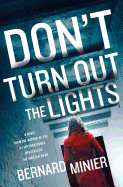 | Publisher: | | Minotaur Books |
| Genre: | | Police Procedural, International Mystery & Crime, Mystery & Detective, Fiction
|
| ISBN: | | 9781250106056 |
| Pub Date: | | December 2016 |
| Price: | | $26.99 |
| Don't Turn Out the Lights
by Bernard Minier, trans. by Alison Anderson
French author Bernard Minier's Don't Turn Out the Lights opens with a deeply disturbing prologue depicting the grisly events encountered by a man walking in a forest with his dog. The scene is unsettling, and will keep readers on edge during what lies ahead.
Radio host Christine finds an unsigned and unaddressed suicide note in her mailbox on Christmas Eve, indicating the writer will kill herself if the letter's recipient doesn't intervene. Christine believes the note was mistakenly delivered to her, but it turns out to be the beginning of a nightmare, one in which her life is insidiously destroyed, by unknown persons and for no reason she can imagine. Will she be able to fight her invisible enemy, or will she choose to end the torture with her own suicide?
This psychological thriller is told primarily from Christine's point of view and that of the man in the beginning chapter, Martin Servaz (who appeared in The Circle), a cop on leave for depression. He receives clues from an anonymous sender imploring him to reevaluate an old case labeled a suicide, making Servaz wonder if a more sinister story lies behind it. His path eventually converges with Christine's, but he fears he may be too late to save her.
Minier sustains a sense of dread throughout. It's frustrating--and sometimes unconvincing--how easily Christine's tormentor can manipulate her supporters, including her fiancé, to turn against her, but once she's forced to fend for herself, she becomes a resourceful heroine. Christine endures one blow after another, but her nemesis finds it's harder than expected to put her lights out. -- Elyse Dinh-McCrillis, blogger at Pop Culture Nerd |
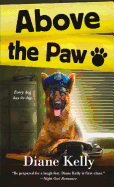 | Publisher: | | St. Martin's |
| Genre: | | Police Procedural, Mystery & Detective, Cozy, Fiction, Women Sleuths
|
| ISBN: | | 9781250094841 |
| Pub Date: | | December 2016 |
| Price: | | $7.99 |
| Above the Paw
by Diane Kelly
Police officer Megan Luz and her German Shepherd K-9 partner, Brigit, return for a fifth installment in the Paw Enforcement mystery series. In Diane Kelly's (Against the Paw) other entries, the two have pursued bombers, gang members, thieves and convicts on the lam. In Above the Paw, the lauded Fort Worth, Tex., duo are on patrol at a Fourth of July celebration, where Brigit sniffs out the street/club drug known as Molly (aka ecstasy) among the crowd. Several students at a nearby college have fallen seriously ill after taking the drug, and matters grow even worse after another student collapses at the event. Is it a coincidence that all who succumbed to the drug live in the same college dorm? Twenty-five-year-old Megan volunteers herself and Brigit to go "back to school," where the two work undercover--Megan as a college student and Brigit as her devoted health-service dog--in order to flush out the drug-dealing connection.
The story is told from the points of view of Megan, Brigit and the mysterious perpetrator, which heightens the danger, drama and suspense. Kelly has a keen grasp of college life, student quirks and foibles, as well as politics--on campus and off. Add a dash of comedy and recurring characters like Megan's ex-partner and rival on the police force, along with her sexy bomb squad beau, and Above the Paw delivers another entertaining whodunit in the continuation of this fast-paced series. -- Kathleen Gerard, blogger at Reading Between the Lines |
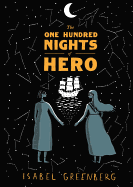 | Publisher: | | Little, Brown |
| Genre: | | Fantasy, Literary, Comics & Graphic Novels
|
| ISBN: | | 9780316259170 |
| Pub Date: | | December 2016 |
| Price: | | $25 |
| The One Hundred Nights of Hero: A Graphic Novel
by Isabel Greenberg
Isabel Greenberg again draws the thick-lined world she introduced in The Encyclopedia of Early Earth for a wry and wise retelling of One Thousand and One Nights that's sure to become a feminist classic. Two friends named Manfred and Jerome make a wager. Jerome insists that his wife is so pure, he himself has not managed to take her virginity. Asserting that all women are deceitful, Manfred bets that he can seduce Jerome's wife. Jerome agrees, even offering to leave town for 100 nights. The winner gets the loser's castle. If Manfred wins, which he intends to do by coercion if necessary, he also gets the lady.
Luckily, Cherry, the lady in question, is not nearly as obedient and pure as her husband believes. She secretly loves her maid, Hero, who overhears the wager and contrives a plan to stall Manfred with 100 nights of storytelling. Every night, Manfred becomes captivated by Hero's stories of jealous sisters, dancing princesses and a moon that walks as a mortal woman. Manfred falls into the trap, telling himself he has weeks to waste. Even if Cherry and Hero can win the wager for Jerome, though, they may still face the repercussions of showing their mettle in a world where men destroy women for "storytelling and sassiness."
Greenberg's elongated, angular characters sport simple, expressive faces and live amid grass-furred woods, misty marshes and lavishly appointed castles. A cry against oppression, a love letter to the human need for stories, a celebration of the many bonds between women, The One Hundred Nights of Hero will leave readers wishing Greenberg had written 1,000 nights instead. -- Jaclyn Fulwood, blogger at Infinite Reads |
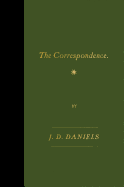 | Publisher: | | Farrar, Straus & Giroux |
| Genre: | | Literary Collections, Essays
|
| ISBN: | | 9780374535940 |
| Pub Date: | | January 2017 |
| Price: | | $20 |
| The Correspondence: Essays
by J.D. Daniels
If you missed J.D. Daniels's crackerjack letters when they first appeared in the Paris Review, The Correspondence is your chance to catch up with this talented, funny, often dark master of the personal essay. Mostly nonfiction, the six pieces in this collection by the Whiting Prize-winning Daniels include experiences as diverse as training in Brazilian jiu-jitsu, laboring as a deckhand on a Mediterranean ship out of Tunisia, kicking around his hometown of Louisville, Ky., and attending a group psychotherapy retreat. They paint a picture of a man who embraced the contrary, did more than his share of drugs and alcohol, stumbled in and out of college, handled marriage poorly, dabbled in therapy and wound up becoming a writer, despite some of the whiny, self-centered colleagues in his writing classes.
Each entry is a striking piece of prose with Daniels's sharp take on life nested inside humor and clever wordplay, but "Letter from Kentucky," about his return to his hometown, is perhaps his most sensitive, observant essay. It opens with a biblical begats list of his ancestors, touches harshly on his parents and the religion pounded into him, tastes the bars and alleys that shaped his youth, and captures the heart of the culture in drive-by panoramas: "I drove past Magic Vapor Shop and Tri-State Floors... Urban Creek Holiness Church... Jimbo's 4-Lane Tobacco and the Federal Correctional Institution." Daniels catches something true about every piece of the unsettled world. -- Bruce Jacobs, founding partner, Watermark Books & Cafe, Wichita, Kan. |
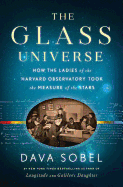 | Publisher: | | Viking |
| Genre: | | Nature, Science, General, 20th Century, History, Star Observation, Astronomy, Modern
|
| ISBN: | | 9780670016952 |
| Pub Date: | | December 2016 |
| Price: | | $30 |
| The Glass Universe: How the Ladies of the Harvard Observatory Took the Measure of the Stars
by Dava Sobel
Long before women had earned the right to vote, a few worked diligently in the astronomy department at Harvard, carefully cataloguing the position and color ranges of the stars, which were preserved through photography onto glass slides. Dava Sobel (Galileo's Daughter) has meticulously researched and recounted the history of these early female astronomers, who were used as human "computers" to perform intricate measurements and calculations while their male colleagues manipulated the heavy telescopes and glass slides to capture the night skies.
For over a century, Harvard collected data in this manner, amassing a library of more than half a million individual photographs, which reveal far more than is visible through the telescope, "because the sensitive plate, unlike the human eye, could gather light and aggregate images over time." Thanks to the women Sobel writes about and their industrious and eye-opening analysis of the photographs, much has been learned about the nature of the universe, the stars and galaxies, such as the composition of the stars, the identification of binary and variable stars and the distance between stars. The codes developed by these women to catalog their findings are still in use today; their names have become part of astronomy's history and their work is now being digitized for future research. Rich in scientific details, The Glass Universe is fascinating and enlightening, filled with the personal desires and triumphs of women who were pioneers in the workplace and in the heavens at a time when male dominance was the norm. -- Lee E. Cart, freelance writer and book reviewer |
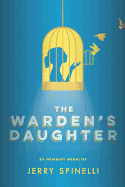 | Publisher: | | Knopf |
| Genre: | | Emotions & Feelings, Death & Dying, Parents, Family, United States - 20th Century, Social Themes, Juvenile Fiction, Historical
|
| ISBN: | | 9780375831997 |
| Pub Date: | | January 2017 |
| Price: | | $16.99 |
| |
Starred
|
Children's & Young Adult |
The Warden's Daughter
by Jerry Spinelli
Jerry Spinelli, author of the Newbery Medal winners Maniac Magee, Stargirl, Milkweed and many other middle-grade books, again proves why he's the king of storytellers. The Warden's Daughter, set in a 1959 Pennsylvania prison, is a buoyant yet powerfully emotional coming-of-age novel that reflects its prickly young protagonist's sense of entrapment in her own inarticulable sadness.
As the Hancock County Prison warden's daughter, "scruffy tomboy" Cammie O'Reilly carries significant social heft among her sixth-grade peers, who are intrigued by the world she shares with "crazed" prisoners of every stripe. But it's among these very souls that Cammie searches for a mother figure: "I was sick and tired of being motherless. I wanted one.... If I couldn't have my first-string mother, I'd bring one in off the bench." She finally settles on her housekeeper, the accused arsonist Eloda Pupko, and gets down to the business of wooing her: Cammie fakes an injury, smokes a cigarette in front of her, mocks her, gives her a gift--all to no avail. Will anything turn Eloda, a woman with bright orange hair and a flat demeanor, into the mother Cammie craves?
To her surprise, during this epic summer of adolescent onset and identity search, Cammie finally understands that she is not a happy person: "The sky is blue. The grass is green. Cammie O'Reilly is not happy." It isn't until years later that Cammie learns that with her gruff compassion and stubbornness she can make her own happiness, and that the people in her life have always been looking out for her in ways she never could have imagined. --Emilie Coulter, freelance writer and editor
|
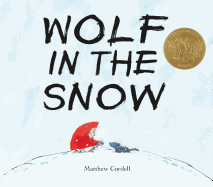 | Publisher: | | Feiwel & Friends |
| Genre: | | Friendship, Animals, Wolves & Coyotes, Social Themes, Juvenile Fiction
|
| ISBN: | | 9781250076366 |
| Pub Date: | | January 2017 |
| Price: | | $17.99 |
| Wolf in the Snow
by Matthew Cordell
With a light snow falling outside, two smiling, mug-sipping parents, their daughter and dog are seen through a log-house window. Soon the bundled-up, red-coated girl is heading uphill on her way to school, waving back to her barking dog: "bark! bark! bark!" is shown as handwritten letters floating in the sky. Next up are two juxtaposed "portholes": on the left side a girl (a pointy red triangle with legs) roams the wintery landscape and on the right a pack of wolves does the same. (Yes, this is foreshadowing.) By school's end, the snow has picked up, ominously. The girl heads home and the wolves are on the move, their breath steaming white in the cold.
Wolf in the Snow by Matthew Cordell (Trouble Gum; Another Brother) is an almost wordless story told in watercolors, snowy white paint daubs and scratchy, kinetic pen-and-ink line work reminiscent of Quentin Blake or James Stevenson. The words are mostly howls (wolves), growls (a mad raccoon) and screeches (an owl). When the lost girl meets a lost wolf pup in the woods, the words are "huff huff" and "whine whine." She scoops him up, listens as his "howwll" is answered, and trudges through a vast snowscape to reunite the scared pup with his pack.
Now exhausted, the girl collapses in the snow. As her little dog barks worriedly in the distance, the pack finds her. More howling, more barking, and the girl is rescued by her parents. This heartwarming story is simple but profound in its messages of selflessness and courage, and how we're all in this together, no matter the species. -- Karin Snelson, children's & YA editor, Shelf Awareness |
|
» http://www.shelf-awareness.com/sar-issue.html?issue=571
|











